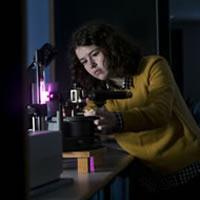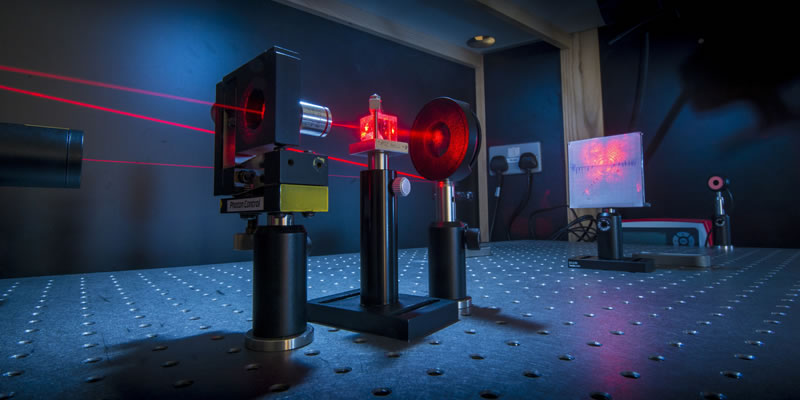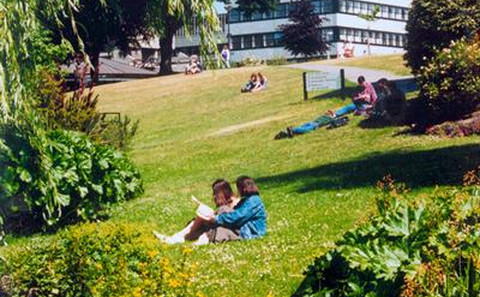You’ll be introduced to the fundamental concepts of nanoscience from year one, building on this in later years with more in-depth study of light and matter interactions, quantum devices and nanomaterials.
This is a highly interdisciplinary subject, so alongside your physics studies you’ll learn how other disciplines relate to nanotechnology. There’s a module on the structure and function of macromolecules in living cells, for example, and you’ll also learn about photonics (the science of light).
In year four you’ll work with a fellow student on an in-depth research project. This could be practical or theoretical and could involve fabricating your own nanoscale device. You can choose a project that interests you from a range offered by our researchers, which might tackle an aspect of:
- new forms of light generation
- sustainable technology, such as more efficient solar cells or LED lights
- storing and transmitting information using light, for applications in quantum computing
- the properties of materials such as ultra-thin coatings and carbon nanotubes
View the 2019/20 programme specification document for this course
View the 2020/21 programme specification document for this course
Research-grade facilities
You’ll use state-of-the-art equipment in our teaching laboratories. This includes facilities for testing and examining the properties of nanomaterials such as X-ray microscopes, scanning electron microscopes and X-ray diffraction equipment. Expert technicians are on hand to support your experimental work.
The University is also home to a superb Cleanroom Complex which houses advanced nanofabrication facilities that are available for fourth-year research project work.
Our excellent facilities enable us to bring concepts to life. For example, you’ll gain greater insight into the challenging theories of quantum mechanics through a demonstration of the well-known double-slit experiment.
Other specialist facilities include:
- a photonics lab with the latest laser equipment
- one of the world’s most powerful supercomputers
You’ll also benefit from our recently refurbished Physics and Astronomy foyer, with a specialist library and dedicated study spaces.
A top-five research department
Study with us and you’ll join one of the top five Russell Group departments for physics and astronomy research (REF 2014). Our research reputation is built on a track record of discovery and we remain on the frontline of new developments. For example, Southampton physicists were instrumental in the development of erbium doped amplifiers – components that underpin the internet – and more recently our scientists were involved in detecting gravitational waves and light from the collision of two neutron stars for the first time.
Our Quantum, Light and Matter group conducts nanotechnology research of international standing. You’ll be taught by researchers from this group, who will share the latest advances in their field with you – often before they reach the media.
Accreditation
Our MPhys Physics with Nanotechnology is accredited by the Institute of Physics.
Programme Structure
Throughout the degree you’ll study core physics subjects alongside specialist nanotechnology modules. Optional modules in years three and four give you the freedom to deepen your knowledge in areas of physics that interest you. You might strengthen your computing or mathematical skills, for example, or learn more about photonics, medical physics or signal processing.
You could also broaden your intellectual horizons by learning a language or choosing from a range of innovative cross-disciplinary modules, on topics including law, business and bioengineering.
If you change your mind about your field of study after you arrive, our programme structure makes it possible to switch to the MPhys Physics or BSc Physics degree up until the end of year two. It may also be possible to change to one of the other specialist programmes, provided you’ve taken the required modules.
To Apply
All undergraduate applications for Physics and Astronomy should be made online through the Universities and Colleges Admissions Service (UCAS).
Find out how to apply and get further details about UCAS' website, phone and contact details.
Key Facts
Learn how light, matter and machines behave at the nanoscale
You’ll have access to one of the largest nanofabrication facilities in Europe, where you’ll build your own nanodevices
Nanotechnology is widely used in industries ranging from medicine to electronics. You'll be prepared for an exciting career in industry R&D, further study at PhD level - or a wide range of other professions.


